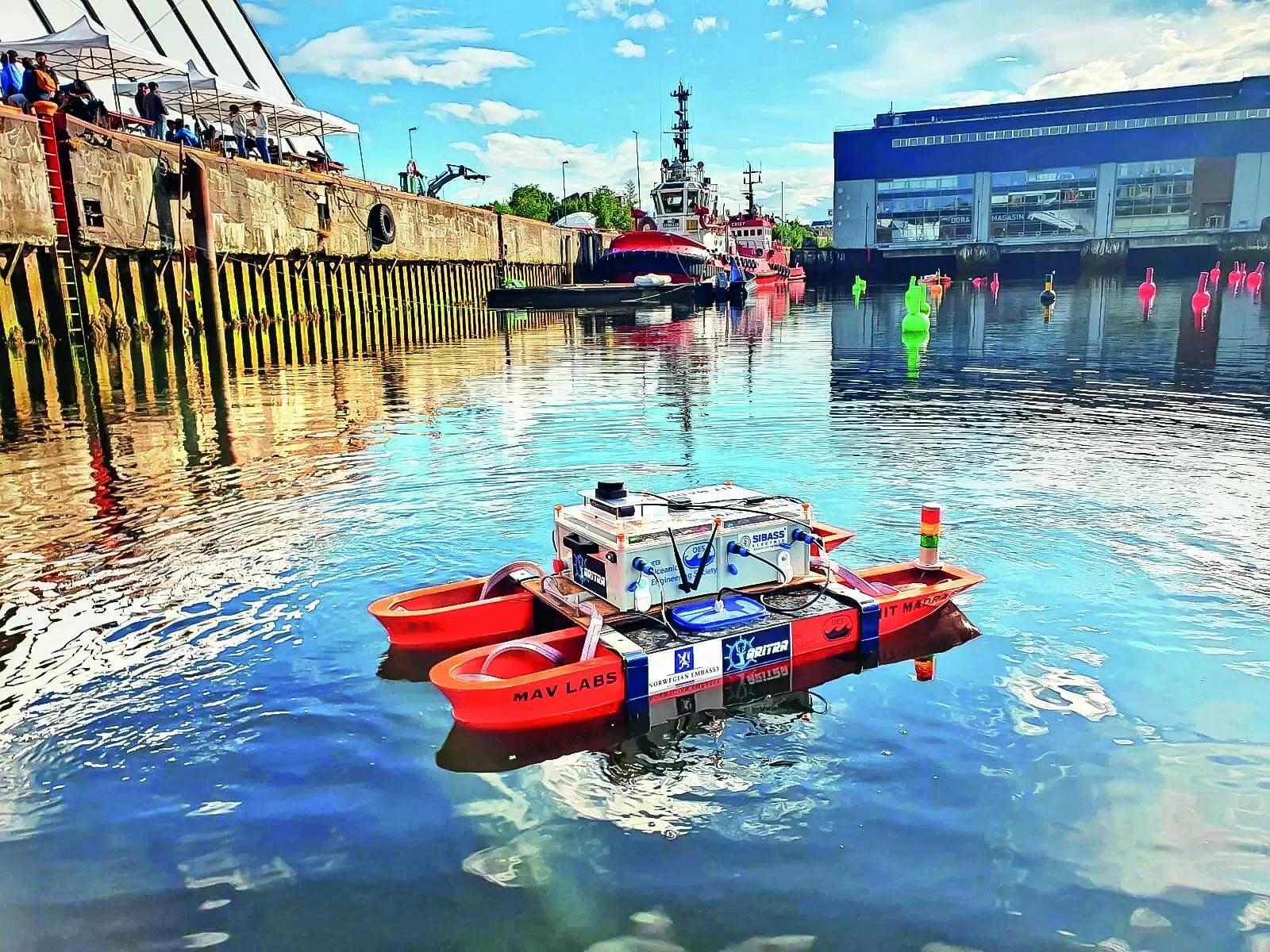Indian Institute of Technology Madras (IIT Madras) Student Team Aritra has secured third place globally and also won the Sustainability Award in Njord Challenge 2023, a global competition hosted recently by the Norwegian University of Science and Technology, Norway. They also won a cash prize of 10,000 NOK (Norwegian Krone).
Njord – Autonomous Ship Challenge is a unique, international student competition in which participants are tasked with designing and building an autonomous ship. Teams are invited to bring their vessels to Trondheim’s fjord where they compete in a series of challenges and events.
The competition is held for the students with the goal to inspire innovation and smart autonomy solutions for marine domain. The competition also offers students with an opportunity for professional development and networking. The competition saw participation from seven top international teams including one from Massachusetts Institute of Technology (MIT), USA.
Team Aritra comprises of four students from the Department of Ocean Engineering’s Marine Autonomous Vessels (MAV) Laboratory – Mohammed Ibrahim M, Amarnath Singh, Akash Vijayakumar and Rakshin Ramesh. They were mentored by IIT Madras faculty Dr Abhilash Sharma Somayajula and Professor MA Atmanand. The team was also supported by Prabhakaran Jay, Vallabh Deogaonkar from the MAV Laboratory.
The competition involved testing of the autonomous surface ships in three facets:
1. Ability to autonomously navigate in a channel marked by navigational buoys
2. Ability to dock the vessel autonomously
3. Ability to autonomously detect and avoid dynamic obstacles while following the rules of the waterways (also known as COLREGS).
The applications for this project are varied. In the context of the safety and security of the country, such vehicles will be able to do live monitoring of coasts, especially strategic locations such as ports, harbours, and defence installations, among others, on a continuous basis. These vehicles could be mounted with a suite of sensors to monitor the seas and the ocean-atmosphere to collect data autonomously, which could then be used in models leading to climate change studies.
Central to their success was the invaluable support provided by sponsors such as IEEE Oceanic Engineering Society, Madras Chapter, which played a pivotal role as a technical and financial sponsor, bolstering the team’s technical capabilities and providing a solid foundation for their endeavours. The generous contribution of the Royal Norwegian Embassy in New Delhi as a travel sponsor enabled Team Aritra to physically participate in the competition, turning their aspirations into reality.
Njord – Autonomous Ship Challenge is a unique, international student competition in which participants are tasked with designing and building an autonomous ship. Teams are invited to bring their vessels to Trondheim’s fjord where they compete in a series of challenges and events.
The competition is held for the students with the goal to inspire innovation and smart autonomy solutions for marine domain. The competition also offers students with an opportunity for professional development and networking. The competition saw participation from seven top international teams including one from Massachusetts Institute of Technology (MIT), USA.
Team Aritra comprises of four students from the Department of Ocean Engineering’s Marine Autonomous Vessels (MAV) Laboratory – Mohammed Ibrahim M, Amarnath Singh, Akash Vijayakumar and Rakshin Ramesh. They were mentored by IIT Madras faculty Dr Abhilash Sharma Somayajula and Professor MA Atmanand. The team was also supported by Prabhakaran Jay, Vallabh Deogaonkar from the MAV Laboratory.
The competition involved testing of the autonomous surface ships in three facets:
1. Ability to autonomously navigate in a channel marked by navigational buoys
2. Ability to dock the vessel autonomously
3. Ability to autonomously detect and avoid dynamic obstacles while following the rules of the waterways (also known as COLREGS).
The applications for this project are varied. In the context of the safety and security of the country, such vehicles will be able to do live monitoring of coasts, especially strategic locations such as ports, harbours, and defence installations, among others, on a continuous basis. These vehicles could be mounted with a suite of sensors to monitor the seas and the ocean-atmosphere to collect data autonomously, which could then be used in models leading to climate change studies.
Central to their success was the invaluable support provided by sponsors such as IEEE Oceanic Engineering Society, Madras Chapter, which played a pivotal role as a technical and financial sponsor, bolstering the team’s technical capabilities and providing a solid foundation for their endeavours. The generous contribution of the Royal Norwegian Embassy in New Delhi as a travel sponsor enabled Team Aritra to physically participate in the competition, turning their aspirations into reality.
Denial of responsibility! Todays Chronic is an automatic aggregator of the all world’s media. In each content, the hyperlink to the primary source is specified. All trademarks belong to their rightful owners, all materials to their authors. If you are the owner of the content and do not want us to publish your materials, please contact us by email – todayschronic.com. The content will be deleted within 24 hours.


